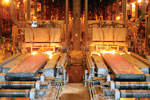

Unidrive SP AC drives feature on the latest continuous slab caster, at Corus steelworks in Port Talbot, South Wales, controlling critical operations at the head of the production line.
Continuous Caster 3 (CC3) is a completely new operation, aimed to increase the output of the Welsh plant by 25%. Previous major contracts for Control Techniques had been upgrades, re-utilising existing DC drives, so the drive of choice was Mentor II. Now, looking to the potential benefits of reduced motor maintenance from a switch to AC, and the reduced downtime that this implies, the project team grasped the opportunity for increased efficiency. Again stating a preference for Control Techniques on the CC3 project, Corus elected for the Unidrive SP.
"This is our first real experience with Control Techniques' Unidrive SP AC drives," says Corus Concast engineer, Roger Morgan. "We have found them to be very reliable, easy to use and easy to configure. The whole approach to this project has been a move forward in technology, with digital interfaces and greatly reduced wiring."
The proposition was based on the latest AC drive and motor technology from Emerson Industrial Automation companies' Control Techniques and Leroy Somer. All the motors ensured totally enclosed protection for improved reliability and less downtime. The scope incorporated two new AC Drive Motor Control Centres, employing some 60 AC Unidrive SP variable speed drives and Leroy Somer AC motors. The drives provided a much improved load sharing, a more consistent casting speed, shorter rethread times, and a big boost in reliability. All these features were a pre-requisite for greater productivity and finished steel quality.
Key to the successful operation of the plant was the intelligent load sharing system, pre-programmed into each Unidrive SP drive, using the on-board facility of the plug-in application modules. The success of this software, with its benefits of reduced wear and more consistent casting speed, is very evident in the motor current trends. Rethread times are also much faster, with any limitations being factors other than the drive electronics.
The new AC motors manufactured by Leroy Somer, were each fitted with digital encoders and brakes on the vertical part of the caster. The drive control included on-board intelligence and specific application software, part of which included closed loop to open loop changeover in the event of a feedback device failure, thus ensuring the caster continues to run.
“The whole system is more modular,” explains Roger Morgan. “The intelligence in the system is distributed rather than central, and this means that just one Unidrive SP Inverter is designated as the master and communicates with the plant PLC. This Master then communicates in turn via CTNet with all the other strand drives, keeping them digitally synchronised. For reasons of dual redundancy, 'Automatic Seamless Master Transfer' – passes Master control to the next drive in line, in the event of failure. This means that, if necessary, the line could be run manually. It is now much more flexible and reflects many of the lessons we have learnt over many years of steel-making. The evidence of its success is reflected in the 30% increase in strand speed and the reduced turn-around times.
“We are very pleased with the results of this major project,” continues Roger Morgan. “The after sales support we receive from Control Techniques has been excellent and indeed our long-standing experience of good support over several major schemes was a factor in Control Techniques being chosen for this project.”
For more information contact Bill Tedd, Control Techniques, +27 (0)11 462 1740, [email protected], www.controltechniques.com
| Tel: | +27 11 462 1740 |
| Fax: | +27 11 462 1941 |
| Email: | [email protected] |
| www: | www.nidecautomation.com |
| Articles: | More information and articles about Nidec Industrial Automation Southern Africa |
© Technews Publishing (Pty) Ltd | All Rights Reserved